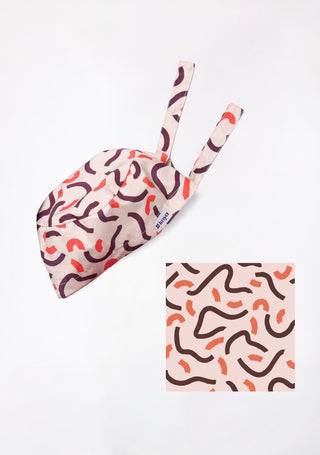Keeping your medical white coat clean requires diligence, but with the right cleaning techniques, you can ensure it remains spotless and professional-looking. Whether you’re dealing with blood, coffee, ink, or food stains, acting quickly and using proper stain removal methods can save your coat from permanent damage. Regular washing, stain pre-treatment, and periodic whitening treatments will keep your coat looking fresh and bright, helping you maintain a polished appearance in the medical field.
Basic Cleaning: Regular Maintenance for a Crisp White Coat
Regular cleaning is the key to keeping your white coat in top condition. Here’s a step-by-step guide:
Read the Label
Always check the care label on your white coat before washing. Some coats are made of cotton blends, while others have polyester or synthetic fibers that require special care.
Pre-Treat Stains
Before tossing your coat in the washer, inspect it for stains and pre-treat them using a stain remover or a mixture of baking soda and water.
Use Cold Water and Mild Detergent
Wash your coat in cold water to prevent setting stains. Choose a mild detergent that’s safe for white fabrics and free from harsh chemicals that could damage the fibers.
Avoid Bleach
While bleach may seem like the go-to solution for whitening clothes, it can weaken the fabric over time. Instead, opt for oxygen-based whiteners like hydrogen peroxide or a vinegar-water solution.
Browse best Scrubs Collection
Wash Separately
Always wash your white coat separately or with other white garments to avoid color transfer.
Air Dry or Low-Heat Drying
High heat can shrink or damage your coat. If possible, air dry it in the sun for natural bleaching, or use a low-heat setting in the dryer.
Removing Common Stains
Blood Stains: Act Fast!
Bloodstains can be one of the most stubborn marks on a white coat, so quick action is essential.
- Cold Water First: Never use hot water, as it will set the stain. Instead, rinse the affected area with cold water as soon as possible.
- Hydrogen Peroxide Trick: Apply a small amount of hydrogen peroxide directly onto the stain and let it bubble. Rinse and repeat if necessary.
- Salt & Water Paste: If hydrogen peroxide isn't available, make a paste with salt and cold water and gently rub it into the stain.
Coffee Stains: No More Morning Mishaps
A busy shift often includes a much-needed coffee break, but a spill on your white coat can be a nightmare.
- Blot, Don’t Rub: Use a paper towel to blot excess coffee without spreading it.
- White Vinegar Solution: Mix equal parts white vinegar and water, then dab the stain with a clean cloth.
- Baking Soda Paste: Another trick is applying a paste of baking soda and water to the stain, letting it sit for 10 minutes before rinsing.
Shop the Best Lab Coats from Here!
Food Stains: Because Doctors Eat Too
From ketchup to curry, food stains are inevitable. The cleaning method depends on the type of stain:
- Oil-Based Stains (Grease, Butter, Salad Dressing): Sprinkle cornstarch or baby powder on the stain to absorb excess oil, then wash as usual.
- Tomato-Based Stains (Pasta Sauce, Ketchup): Rinse with cold water and apply dish soap directly to the stain before washing.
- Dairy & Protein Stains (Milk, Yogurt, Egg): Soak in cold water before washing with an enzyme-based detergent.
Ink Stains: The Pen that Won’t Stay in Your Pocket
Ink stains are notorious for ruining white coats, but they’re not impossible to remove.
- Rubbing Alcohol: Dab the stain with a cloth soaked in rubbing alcohol, then blot with a dry towel.
- Hairspray Hack: Spraying hairspray on an ink stain can break down the ink, making it easier to wash out.
- Milk Soak: Soaking the stained area in milk for a few hours before washing can also help lift the ink.
Contagious Bodily Fluid Stains: A Serious Concern
Working in a hospital means dealing with potential contamination. Proper handling of stains caused by bodily fluids like vomit, urine, or blood is crucial for hygiene and safety.
- Use Gloves: Always wear gloves when handling these stains to prevent contamination.
- Pre-Treat with Disinfectant: Use a mixture of hydrogen peroxide and detergent to break down the stain and disinfect the fabric.
- Hot Water & Enzyme Cleaner: If safe for your coat’s fabric, wash it in hot water with an enzyme-based detergent to fully sanitize it.
Reboot Your Coat: Keeping It Bright and White
Even with regular washing, white coats can start to look dull over time. Here’s how to keep them looking fresh:
Lemon Juice & Sunlight Treatment
Lemon juice is a natural brightener. Add half a cup of lemon juice to your wash cycle, then let your coat dry in direct sunlight for extra whitening power.
Baking Soda Boost
Adding a half-cup of baking soda to your detergent helps remove odors and restore whiteness.
Vinegar Rinse
A final rinse with white vinegar (1/2 cup in the rinse cycle) softens fabric and removes lingering residues.
Avoid Fabric Softeners
Fabric softeners can leave a residue that makes white fabrics appear dingy over time. Stick to natural alternatives like vinegar.
Professional Whitening Treatments
If all else fails, taking your coat to a professional dry cleaner can help restore its original brightness.





















































